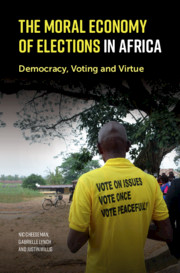Book contents
- The Moral Economy of Elections in Africa
- The Moral Economy of Elections in Africa
- Copyright page
- Dedication
- Contents
- Figures
- Tables
- Acknowledgements
- Abbreviations and Glossary
- Introduction: Writing African Elections
- 1 Towards a Moral Economy of Elections in Africa
- 2 Elections, States and Citizens
- Part I Promoting Civic Virtue
- Part II The Moral Economy in Action
- 6 Performing Virtue
- 7 Navigating Multiple Moralities
- Conclusion: The Electoral Fallacy Revisited
- Appendix 1: Research Methods
- Bibliography
- Index
Conclusion: The Electoral Fallacy Revisited
from Part II - The Moral Economy in Action
Published online by Cambridge University Press: 15 December 2020
- The Moral Economy of Elections in Africa
- The Moral Economy of Elections in Africa
- Copyright page
- Dedication
- Contents
- Figures
- Tables
- Acknowledgements
- Abbreviations and Glossary
- Introduction: Writing African Elections
- 1 Towards a Moral Economy of Elections in Africa
- 2 Elections, States and Citizens
- Part I Promoting Civic Virtue
- Part II The Moral Economy in Action
- 6 Performing Virtue
- 7 Navigating Multiple Moralities
- Conclusion: The Electoral Fallacy Revisited
- Appendix 1: Research Methods
- Bibliography
- Index
Summary
This chapter re-evaluates the idea of the “electoral fallacy” – idea that academics and policy makers mistake elections for democracy, and in so doing exaggerate the importance of the polls. We agree that there has long been a tendency to place unrealistic expectations on the electoral process, but reject the argument that elections are unimportant when they don’t lead to political change. The great weakness of some critiques of elections that have emerged over the last twenty years – the fallacy of the fallacy – is that they have underestimated the impact of elections by misleadingly narrowing this down to the question of whether the polls result in a transfer of power. Elections have multiple, sometimes contrary effects. By creating space for politicians and voters to make reciprocal claims to patrimonial virtue they may encourage people to think of themselves primarily as members of more local communities, demanding a very personal and local accountability. But the rhetoric of campaigns and elaborate technology of elections may also encourage voters to think and behave as national citizens. In this way, electoral processes perpetuate existing forms of power at the same time as they highlight problems with, and impose constraints on, that power. Consequently, elections matter – even when they don’t change the government.
- Type
- Chapter
- Information
- The Moral Economy of Elections in AfricaDemocracy, Voting and Virtue, pp. 289 - 303Publisher: Cambridge University PressPrint publication year: 2021



